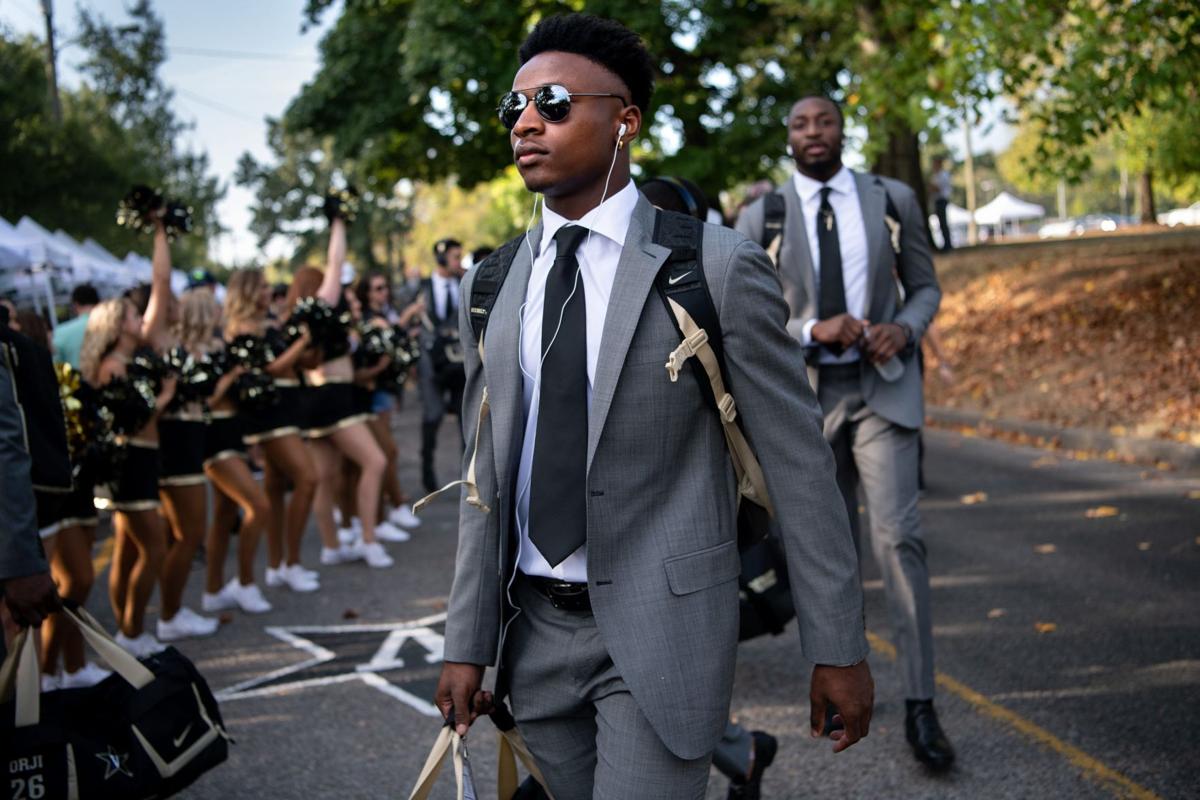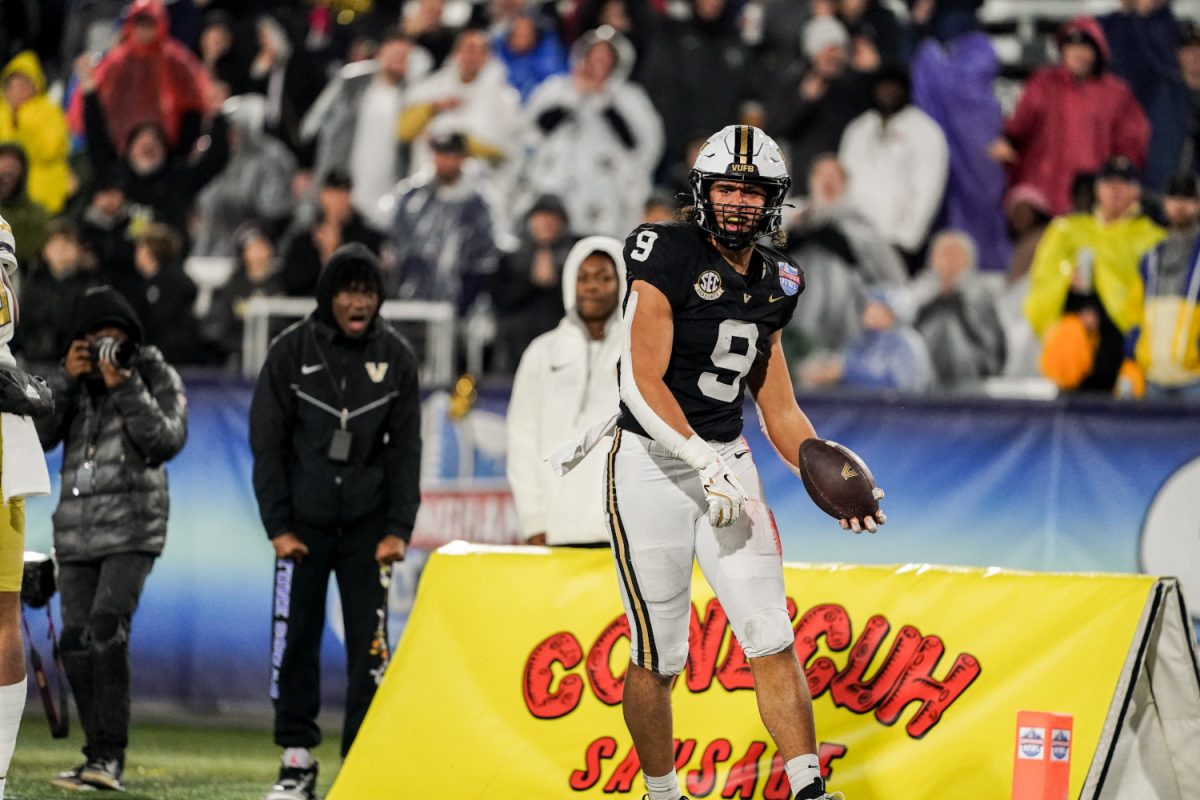When he was 18 years old, an exceptional student coming from an accomplished high school, Camden Coleman first moved from his hometown of Urbana, Illinois to Nashville in pursuit of a four-year college education. He chose to attend Vanderbilt, and he chose Vanderbilt with conviction. He applied early decision. He was certain it was where he wanted to be.
Coleman had flirted with the idea of applying to the University of Illinois, but decided to venture further away from home. Both of his parents, Barrington and Cynthia Haymon Coleman, used to teach at the University of Illinois. It was right in his backyard. Plus, he says, his mother had always encouraged him to live in a new city.
Then, he considered Washington University in St. Louis. Like Vanderbilt, Wash U presented an opportunity further away from his hometown. Like Vanderbilt, which tied for 14th-best university in the 2020 U.S. News College Rankings, Wash U, ranked 16th-best, would provide him with a top-tier education.
But Vanderbilt provided him with something unique— something the other schools lacked. And it wasn’t football; that was never the slightest consideration. Not the Southeastern Conference (SEC), either. Not head football coach Derek Mason, not the pipeline of Commodore alumni in the National Football League, not Vanderbilt Stadium, not an official recruiting visit, not a home visit from a coach. Forget about sports. They were not a factor.
It was Vanderbilt’s MOSAIC program that made the difference, that made Vanderbilt “just seem more like home,” Coleman says. Vanderbilt’s MOSAIC program (Medley Of Students And Ideas Connecting) is dedicated to “developing and maintaining a campus community of ethnic and cultural diversity,” according to its page on AnchorLink, by rounding up exceedingly qualified, diverse individuals from different backgrounds to attend the university.
At the end of the day, Coleman came to Vanderbilt for the high-class education, the new city and the MOSAIC community. He was just a normal student. Well, he was a musician, too, well-versed in playing the piano and cello, “but it was never to be a profession,” he says. “It was always just a hobby.” He was also an athlete with an insatiable, competitive spirit, which brought him to play basketball, soccer and run track at an early age. But as a normal student, being an athlete meant playing pickup basketball at the Rec. It meant putting up shots with friends or watching and following the professional sports he’s loved for his whole life.
Never—not in elementary school, not in middle school, not in high school and certainly not entering college—did it mean playing football.
Coleman, who stood at just over six feet tall, weighing in just north of 200 pounds, had never played a snap of organized football in his life.
“I had no knowledge at all of that kind of stuff,” Coleman says of his freshman year football IQ. “Except for playing Madden. You know, on the PlayStation.”
And unsurprisingly, playing Madden didn’t quite prepare him to play in the SEC. Coleman smirked when asked what he learned from playing the popular NFL video game.
“Not much,” he says. “I’m not good at Madden, either. I was just pressing what it told me to press, then trying to make a play. At least I knew how the rules of the game went.”
An athlete in a musician’s world
Walking onto a college football team in the nation’s best conference is rare. Factor in Coleman’s lack of experience and his backstory, growing up in a household that never prioritized sports, and it might even seem impossible.
Coleman’s family was musically-oriented; sports were hardly in the picture. Prior to his parents’ tenures as music professors, “they were opera singers,” Coleman says humbly, adding, “my dad was mostly in jazz, but also did opera.”
What Coleman failed to mention? His mother, Cynthia, is not just any opera singer. She’s a Grammy-nominated opera singer. And while his father may not have been nominated for a Grammy, Barrington—a three-time college graduate with a doctorate in music arts from Julliard School of Music—has quite the track record.
“They were always big into music,” Coleman says. “I was always into music as well. I played piano and cello. I sang a little bit, so we weren’t really a sports-oriented family. The sports were kind of out of the box for us.”
While sports were a nonfactor in the Coleman family, Cynthia and Barrington realized their son was different. Ever since he was a young child, sprinting circles around the house asking his mother to time him, he was destined to forge his own path in sports.
“I was always a very active kid,” Coleman says. “[My parents] knew I would be interested in playing sports. I started with basketball. They put me in basketball when I was like seven years old. I played soccer when I was like eight years old. And then eventually I ran track when I got to middle school. I was a very competitive kid, so they knew that I had to be on a field or a court somewhere.”
Coleman fell in love with basketball in elementary school. He molded his game after his favorite player, LeBron James. At least, he did so until he discovered a new favorite athlete: Usain Bolt.
Then, in sixth grade, Coleman picked up track. He ran all the way to the Junior Olympics.
“It’s confusing. People think it’s like a big thing,” Coleman says of the Junior Olympics, before pausing. “I guess it is a big thing. USA Track and Field holds a Junior Olympics within the states, so that’s what I was competing in. I got to the finals two years out of the three years I competed.”
At times, Coleman’s passions even intersected. He would frequently come home from football games, track meets or basketball games and play piano. It relaxed him. It gave him some peace of mind.
“I would be stressed out a lot of times. I would sometimes play piano to relax,” he says. “I didn’t speak much growing up, so the two ways I express myself are musically and through sports. Those are my two outlets; that’s what kept me sane growing up.”
Coleman’s love for sports, like his love for music, never wavered. If anything, it grew stronger. As did his passion for football.
Despite never playing a snap, Coleman had a fervent desire to take his athleticism to the gridiron. And the fact that his mother opposed the idea made him that much more curious.
“She didn’t want me to play, so it was like the forbidden fruit for me,” Coleman says. “So I knew when I got here, there was no men’s track team, so that wasn’t an option. I thought about trying out for basketball, but I really wanted to get playing time, and it’s a small roster. And football, I always wanted to play. So I figured why not?”
Hard work, dedication and maybe—just maybe—a little luck
Coleman dedicated himself to the craft. Throughout the fall of his freshman year, he spent his free time at the gym or on the field. At times, he’d find himself playing pick-up basketball, with friends and peers telling him he should instead try out for the men’s basketball team.
“People thought I should walk onto the basketball team,” Coleman recalls. “But what I was really trying to do was get in shape for football.”
Coleman was dead-set on playing football. He didn’t listen to those distractions. The only people he wanted to listen to were football coaches. But since he had no football coaches, he had to settle for the coaches that posted videos of drills on YouTube.
“I’d go to the practice field [in the rec center] and try to just do some drills I saw on YouTube and stuff,” he says. “I wanted to be a defensive back, so I would do backpedaling drills and different footwork and agility drills. Anything I could find [on YouTube] that looked like it was football-related.”
When he wasn’t training, he was watching. He watched every home Vanderbilt football game from the student section, and he watched as much college football as he found on television. While it may have helped him understand playcalling, clock management and other in-game strategies with which he was previously unfamiliar, he didn’t like watching it. He hated it.
“I was watching [games],” he says, “But I wished I was out there the entire time. I wished that I was out there playing. So it was hard to watch. But I did try to keep up with what was going on.”
Coleman didn’t have a trainer. He didn’t have a real coach. All he had was “a once-in-a-lifetime opportunity.”
“The football team had not had an open tryout for something like eight years,” Coleman says. “And it just happened to be this perfect time in the spring [of freshman year]. So I was like, ‘this is God telling me to take this shot.’”
After hearing about the spring tryout, Coleman continued training. But throughout the fall semester, he kept it low-profile. He didn’t want others to know.
“I wasn’t saying it too much because people weren’t taking me seriously,” he said. “I had people telling me, ‘You know what? This is Division I football. The SEC. You don’t know what you’re getting into. Maybe you should just be thankful for what you do have and get involved in intramural sports.’”
It didn’t bother him. He just kept working, waiting and preparing for that March tryout.
“I was hard-headed. I didn’t want to believe that.”
Captain Coleman assumes position
Unsurprisingly, when Coleman showed up to the tryout, he was nervous.
He looked to his left, then to his right, but saw only kickers and punters. There wasn’t a single person trying out for defensive back. It was up to him, and he knew the ball was in his court.
“I was obviously nervous,” he says. “But I just knew if I have it, I have it. If I don’t, I don’t. So I’m going to give it my best.”
A couple coaches put him through drills. They tested his speed, his coordination and gauged his athleticism. The coaches watched as he ran, then waved over a few more coaches; as if to say, “you’ve got to come see this.”
They set up more agility drills. He kept running, and more coaches kept coming.
Lastly, the footwork drills. And it seemed like with each drill, more and more coaches would come over to watch him run. By the end, almost the entire coaching staff was watching.
“I finished the last drill. And they all came around me and they said, ‘Well, we think we can use you on the team. If you’re ready to commit to this, we’d love to have you.’ So at that point, I was like, ‘Yeah.’ How can you say no to that?”
He made the team, and his parents just so happened to be in Nashville that weekend. They wanted to celebrate his hard work; they wanted to marvel at the astounding accomplishment.
“I came back to [freshmen] Commons, where I was staying at the time,” he says. “They waited in the car. And I came up to them and said, ‘I did it.’ And they went crazy.”
Coleman had his moment of celebration, but quickly got back to work. He kept reminding himself that while the Commodores were midway through spring ball, he had still never strapped on a set of pads. He still didn’t know the playbook. He hardly even knew game strategies.
March turned to April. April turned to May. Finally, by June, Camden was getting into shape both physically and mentally. As he kept working, he continued to keep a low profile. Sure, he had made the team—but he still didn’t tell anyone that it was his first time playing football.
He didn’t want to be treated any differently.
“There’s no life tutor system for football. There’s no acclimation period. It’s just: here are the plays, go do it,” he says. “It really is a new language. And the thing about it that’s tough is there’s no Rosetta Stone that teaches football or a YouTube video that can go over it.”
It seemed that by the time the entire rest of the team had found out, Coleman no longer looked the part. You could hardly tell it was his first time playing football. He was actually logging playing time, in a real game, on special teams. He was actually making a tackle against East Tennessee State on Nov. 23, a moment he says was like “living in a dream.”
It was like his teammates blinked once, and all of a sudden he was an expert.
If they blinked twice?
They’d see Coleman, in his second year ever playing organized football, named a team captain of the 2020 Vanderbilt Commodores.
“I think football-wise, sometimes having no experience allows you to be the best learner. You’re a clean slate for coaches,” Coleman says. “You can do anything you set your mind to. I’ve learned to never let anybody tell you something you can’t do.”







